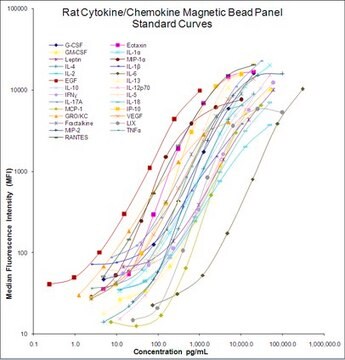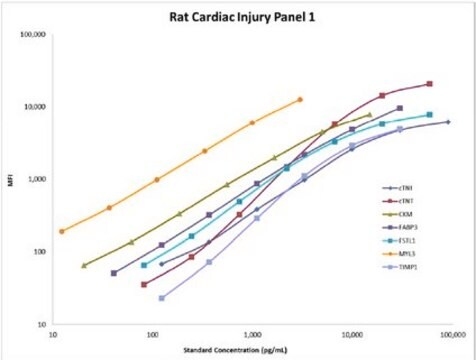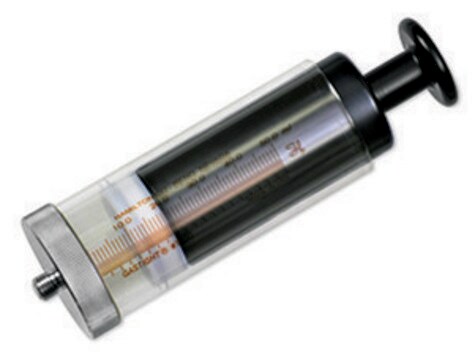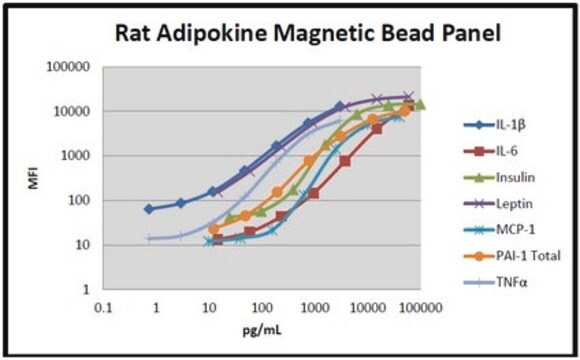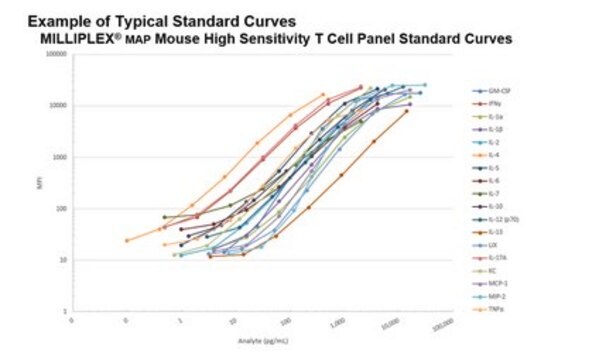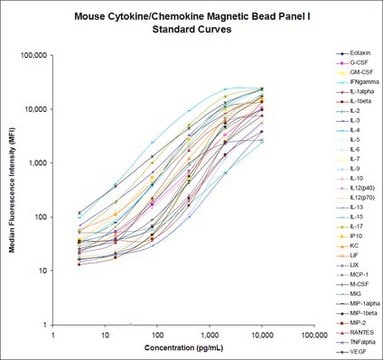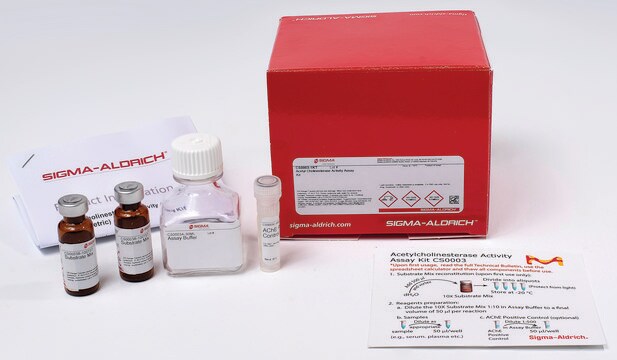RLI1MAG-92K
MILLIPLEX® Rat Liver Injury Panel - Toxicity Multiplex Assay
Synonyme(s) :
Luminex® Rat Liver Toxicity Assay, Millipore Rat Liver Toxicity Assay, Rat Liver Injury Multiplex Panel
About This Item
Produits recommandés
Description
The analytes available for this multiplex kit are: Liver-type arginase 1 (ARG1), aspartate transaminase 1 (GOT1), α-glutathianone S-transferase (GSTα), sorbitol dehydrogenase (SDH), and 5′-Nucleotidase (5′-NT/CD73).
Niveau de qualité
Espèces réactives
rat
Fabricant/nom de marque
Milliplex®
assay range
accuracy: 77-92%
sensitivity: 0.021-4.038 ng/mL
(MinDC+2SD)
standard curve range: 0.02-15.0 ng/mL
(GSTα)
standard curve range: 0.04-30.0 ng/mL
(5′-NT/CD73)
standard curve range: 0.08-60.0 ng/mL
(GOT1)
standard curve range: 0.10-75.0 ng/mL
(ARG1)
standard curve range: 0.62-450.0 ng/mL
(SDH)
Technique(s)
multiplexing: suitable
Méthode de détection
fluorometric (Luminex xMAP)
Conditions d'expédition
wet ice
Description générale
*ARG1, GSTα, and SDH are biomarkers listed in the Predictive Safety Testing Consortium (PSTC) project pipeline which have a strong translational role in drug safety testing.
The MILLIPLEX® portfolio provides a valuable research assay to investigate multiple biomarkers of liver injury in rat serum and plasma samples using the Luminex® xMAP® instrument platform. This kit uses a 96-well format, contains a lyophilized standard cocktail, two quality controls and can measure up to 38 serum or plasma samples in duplicate.
Drug toxicity is the leading cause of acute liver failure in the United States. Patients with liver damage generally display elevated amounts of specific liver proteins in serum; these proteins can serve as biomarkers of drug-related liver toxicity. Monitoring these biomarkers can greatly help clinicians avoid drug-induced liver failure. Performing laboratory tests to characterize the side effects of potential therapeutics is an essential part of drug development. The rat is a leading animal model for these pre-clinical toxicity studies. The search for sensitive, organ-specific toxicity biomarkers is complemented by the development of novel assays to measure these critical analytes. Liver-Type Arginase 1 (ARG1), α-glutathione S-transferase (GSTα), and Sorbitol Dehydrogenase (SDH) are biomarkers listed in the Predictive Safety Testing Consortium (PSTC) project pipeline which have a strong translational role in drug safety testing. Aspartate transaminase 1 (GOT1) and 5′-Nucleotidase / CD73 (5′-NT) are traditional biomarkers recognized by both the Food and Drug Administration (FDA) and its European counterpart, the European Medicines Agency (EMA).
Panel Type: Toxicity
Application
- Analytes: 5′-Nucleotidase (5′-NT/CD73), Liver-Type Arginase 1 (ARG1), Aspartate transaminase 1 (GOT1), α-Glutathione S-Transferase (GSTα), Sorbitol Dehydrogenase (SDH)
- Recommended Sample Type: Rat serum and plasma
- Recommended Sample Dilution: 25 μL per well of 1:25 diluted serum or plasma
- Assay Run Time: 2 hours at room temperature (20-25°C)
- Research Category: Toxicity
Caractéristiques et avantages
Composants
Rat Liver Injury Quality Control 1, 1 vial, lyophilized
Rat Liver Injury Quality Control 2, 1 vial, lyophilized
Assay Buffer, 1 bottle, 30 mL
Wash Buffer, 10X (0.05% Proclin), 2 bottles, 30 mL ea
Rat Liver Injury Detection Antibodies, 1 bottle, 3.2 mL
Streptavidin-Phycoerythrin, 1 bottle, 3.2 mL
Mixing Bottle, 1 bottle
Sample Plate, 96 well format, 1 plate
2 Foil Plate Sealers
Autres remarques
Informations légales
Mention d'avertissement
Danger
Mentions de danger
Classification des risques
Acute Tox. 3 Dermal - Acute Tox. 4 Inhalation - Acute Tox. 4 Oral - Aquatic Chronic 2 - Eye Irrit. 2 - Skin Sens. 1
Code de la classe de stockage
6.1C - Combustible acute toxic Cat.3 / toxic compounds or compounds which causing chronic effects
Certificats d'analyse (COA)
Recherchez un Certificats d'analyse (COA) en saisissant le numéro de lot du produit. Les numéros de lot figurent sur l'étiquette du produit après les mots "Lot" ou "Batch".
Déjà en possession de ce produit ?
Retrouvez la documentation relative aux produits que vous avez récemment achetés dans la Bibliothèque de documents.
Contenu apparenté
See how multiplex assays, such as the Luminex® bead-based multiplex immunoassay MILLIPLEX® Rat Liver Injury Panel, enable researchers to simultaneously measure multiple hepatotoxic biomarkers and cytokines to expand knowledge on drug-induced liver injury processes.
Multiplex toxicity assays enable researchers to simultaneously measure multiple toxicity biomarkers of various organs to gain a better understanding of toxicity. Explore how MILLIPLEX® multiplex toxicity assays are advancing research on liver injury, kidney toxicity, genotoxicity, and more.
Learn the benefits of using biomarker detection multiplex immunoassays for laboratory, companion, and agricultural animal research and explore MILLIPLEX® multiplex assays for veterinary medicine and animal health research.
Notre équipe de scientifiques dispose d'une expérience dans tous les secteurs de la recherche, notamment en sciences de la vie, science des matériaux, synthèse chimique, chromatographie, analyse et dans de nombreux autres domaines..
Contacter notre Service technique